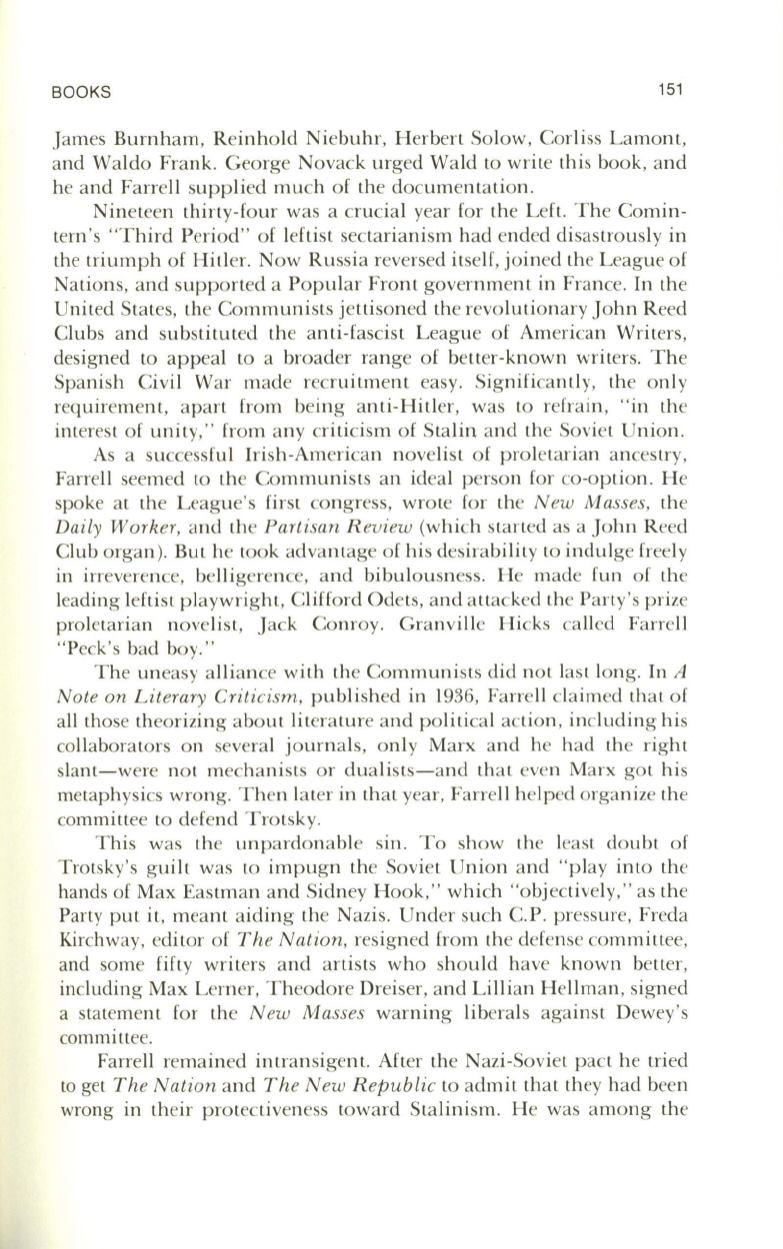
BOOKS
151
James Burnham, Reinho ld Niebuhr, Herbert Solow, Corli ss Lamont,
and Wa ldo Fra nk. George Novack urged Wald LO write this book, and
he and Fa rrell supplied much o f the documenta tion .
Nineteen thirty-four was a crucial year for the Left. T he Comin–
tern 's "Third Period" of leftist sec tarianism had ended disas trously in
the triumph of Hitl er. Now Russ ia reversed itsel£, jo ined the League of
Nations, and suppo rted a Popul ar Front government in France. In the
United States, the Communists jettisoned the revo lutiona ry John Reed
Clubs and substituted the anti-fascist League of American Writers,
designed to appeal to a broader range of better-known writers. The
Spanish Ci vil Wa r made recruitment easy. Significantl y, the onl y
requirement, apa rt from being anti-Hitler, was LO refra in , " in the
interes t of unity," from any criticism o f Stalin and the Soviet Union .
As a successful Irish-American novelist o f pro letari an ances try,
Farrell seemed LO the Communists an idea l person for co-o ption. He
spoke a t the League's first congress, wro te for the
New Masses,
the
Dai ly Wo rker,
and the
Partisan R eview
(which sta rted as a John Reed
Club organ ). But he took advantage of his desirability to indul ge free ly
in irreverence, belli gerence, and bibulo usness. He made fun of the
leading leftist pl aywri ght, Clifford Odets, and a ttacked the Pa rty's prize
proletari an novelist, J ack Conroy. Granville Hicks ca ll ed Fa rrell
"Peck's bad boy."
The uneasy alliance with the Communi sts did no t las t long . In
A
No te on L iterary Criticism,
published in 1936, Farrell cla imed tha t of
all those theori zing a bout litera ture and po litica l action , including his
collabora tors on severa l journals, onl y Marx and he had the right
slant-were no t mechanists or dualists- and tha t even Marx got his
metaphys ics wrong. T hen la ter in tha t year, Farrell helped organize the
committee to defend T ro tsky.
This was the unpa rdonable sin. T o show the least doubt of
Trotsky's guilt was to impugn the Soviet Union and "play into the
hands of Max Eas tman and Sidney Hook," which "obj ectively," as the
Party put it, meant a iding the Nazis. Under such c.P. pressure, Freda
Kirchway, ediLOr o f
The Na tion ,
res igned from the defense committee,
and some fifty writers and a rti sts who should have known belter,
including Max Lerner, T heodore Dreiser, and Lillian Hellman , signed
a statement for the
New Masses
warning liberals aga inst Dewey's
committee.
Farrell rema ined intransigent. After the Naz i-Soviet pac t he tried
to get
The Na tion
and
The New R epublic
LO admit tha t they had been
wrong in their p rotectiveness toward Sta linism. He was among the


